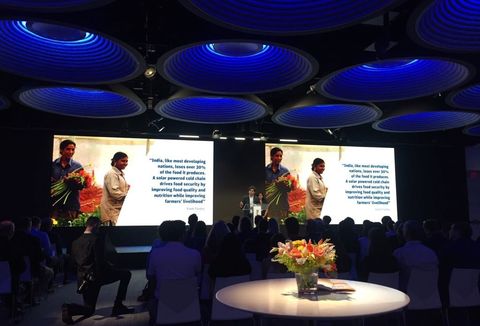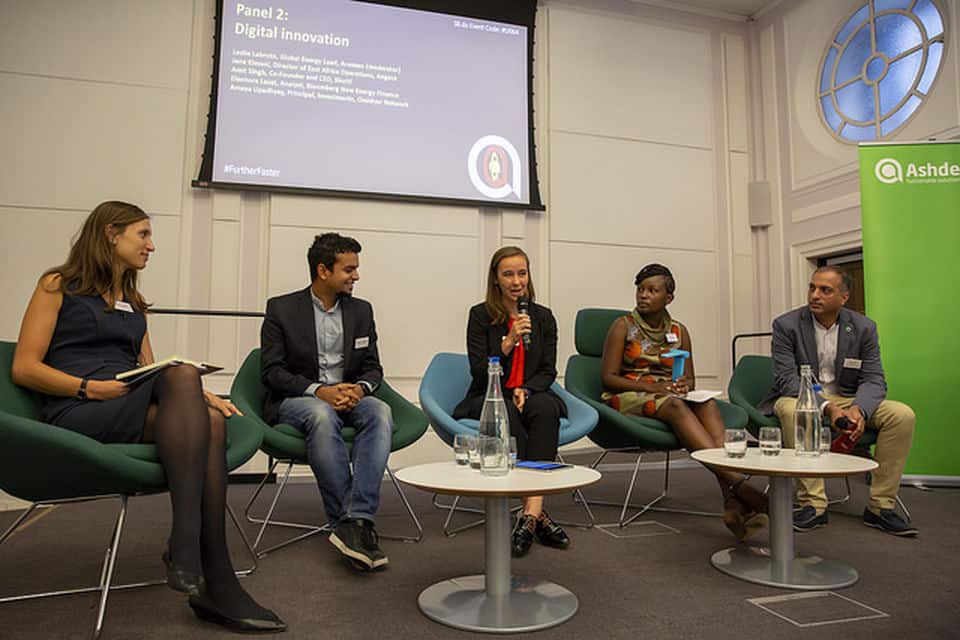
27 Jun | News
Women at the forefront of clean energy – International Women’s Day 2018
Read more
As I was finishing up my semester at University last spring and professors and peers began to ask about my summer internship, I found that explaining Ashden to others was quite straightforward. “Well, I’ll be working for an organisation that awards sustainable energy projects,” I’d respond. Once I arrived at Ashden however, I soon discovered it was not quite so simple.
Three months ago when I arrived at Ashden, I’d heard all about the excitement surrounding Awards week and with 14 years of Awards, it was clear that for anyone working in the sustainability sector, winning one of these was a big deal. What I didn’t realise was the full extent of the work Ashden did beyond just providing recognition and prize money.
The first thing I discovered was that the Awards Ceremony is only one piece, out of a much larger body of work shaping the impact of the sustainable energy sector itself.

The entire Awards week is not only designed to spotlight the innovative ways these organisations are tackling climate change, but also to promote a specific agenda. This year, the annual Ashden Conference addressed the ongoing challenge of accelerating investment in organisations like Ashden’s winners. Barriers to financing sustainable energy systems, especially decentralised solutions, are the reason over 1.2 billion people lack access to modern forms of electricity. Representatives from from Bloomberg, Acumen and more joined the discussion to determine what measures must be taken within the finance sector to change this reality. Throughout the rest of the week, these organisations had the chance to attend investor events, meet with journalists and learn from hundreds of other organisations about their previous successes. For Ashden’s international winners, it’s an introduction to a global platform they can then access to scale their work.
Outside of that week however, it’s not as though everything comes grinding to a halt. The UK-based organisations go on to join an active alumni network. They are brought together regularly for professional development seminars and events like Ashden After Work to discuss industry trends and issues on the national agenda alongside policy makers, investors and energy experts. Thanks to the relationships that Ashden fosters among all these companies, they develop new partnerships, learn how to deliver better services and discuss new solutions and innovations to bring us closer to a low-carbon future.


27 Jun | News
Seven for 7
Read more
Ashden also never fails to focus on the larger picture. The UK Sustainable Cities Programme is working with metropolitan centres, specifically the metro mayoral city regions to rethink how our urban spaces function. Developing and managing resilient, healthy spaces for millions of people to live and work that don’t emit masses of air pollutants and greenhouse gases to the atmosphere are no easy feats. This network uses Ashden winners’ experiences as a means to develop new approaches to such challenges.
Ashden also runs various other programmes to complement their winners’ work. For example, the Ashden India Collective links together Indian winners to promote clean energy and address energy poverty in the region. Fit for the Future, another Ashden spin-off consists of a network of more than 500 individuals and 80 organisations in the non-profit sector to make buildings, land and organisations themselves more sustainable. Ashden’s schools programme, LESS CO2 advises teachers, administrators and others in school communities on energy-saving practices, as well as how to embed sustainability into a school’s curriculum and culture.

This multifaceted approach allows Ashden to enable progress on several of the UN’s Sustainable Development Goals as well as the objectives
of the Paris Climate Agreement. Their work extends beyond energy and environmental sustainability into the realms of public health, gender equality and economic development. Just like the companies they award, Ashden is tackling climate change and improving livelihoods around the world. So yes, it is an Award’s scheme. But it is also so much more than just that.

